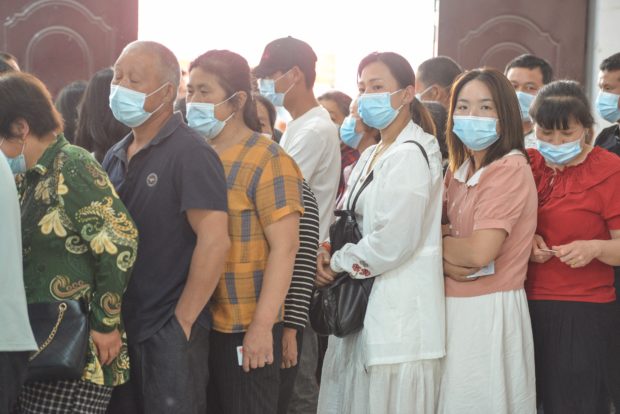China ramps up vaccinations, but uneven rollout leaves borders closed

People queue to receive the Anhui Zhifei Longcom Covid-19 coronavirus vaccine in Linquan county, Fuyang city, in China’s eastern Anhui province on May 25, 2021. (Photo by STR / AFP) / China OUT
BEIJING — China has tripled its daily COVID-19 vaccine rollout in June, inoculating 44% of its population with at least one dose, but its health experts warn against a quick border reopening, citing an uneven rollout and the low rate of full vaccinations.
China rolled out 17.3 million doses per day in June on average, up sharply from 4.8 million in April, as it expanded the list of approved vaccines to seven by adding three more locally-developed shots, and continued to boost production.
But the rollout has been uneven.
By the first week of June, major cities of Beijing and Shanghai fully inoculated nearly 70% and 50% of their residents respectively, but the rate in Guangdong and Shandong provinces remained below 20%.
“(China) is such a big country… Once any of its places open up, it will have a big impact on places that haven’t reached high vaccination levels,” Feng Zijian, a researcher at Chinese Center for Disease Control and Prevention, said earlier this month.
Feng said that China is yet to reach a consensus on what vaccination rate will safely allow adjusting virus control measures, including loosening requirement of quarantine or virus testing for inbound travelers.
China will also wait and see how Japan handles its virus outbreak and the Tokyo Olympics next month before deciding how quickly Beijing needs to loosen its border controls, a person familiar with the situation said.
China is also stepping up vaccinations in preparation to host the Winter Olympics early next year.
Several counties and districts of Zhangjiakou city in northern China, which will host some of the Games, are urging residents to get vaccinated, saying it is a “necessary contribution” that they should make for the international event.
As part of the city’s vaccination campaign, more than 1,800 unvaccinated visitors were dissuaded from entering a park in the Xuanhua district earlier this month and guided to nearby inoculation sites, according to a social media post by the district-level authorities.
“There isn’t much time and the task is heavy,” Wu Weidong, head of the city-level committee of the Communist Party, said in a statement earlier this month.
It said the city is still short of its vaccination target without detailing its target or inoculation rate.
Zero tolerance
China has kept local transmission in check by conducting large-scale COVID tests and seal up neighborhoods and streets when new cases emerged. It refuses to abandon this “zero-tolerance” playbook, even though local outbreaks are tiny compared with those in other countries.
Zhang Wenhong, director of an expert team on COVID-19 treatment in Shanghai city, said at a recent conference it would be too early to drop the policy or fully open up until the full vaccination rate hits at least 70%.
For China, the flip side of low local transmission has been difficulty in gauging clearly how effectively China’s vaccination campaign will help contain the spread of the virus.
Some countries such as Britain and Chile are battling a surge in new cases even as they have among the highest vaccination rates in the world, a cautionary tale for China.
Chile, which used a vaccine developed by China’s Sinovac as its major vaccination tool, said on Monday it would extend a COVID-19 emergency through September, as cases have soured to some of their highest levels since the pandemic began.
For more news about the novel coronavirus click here.
What you need to know about Coronavirus.
For more information on COVID-19, call the DOH Hotline: (02) 86517800 local 1149/1150.
The Inquirer Foundation supports our healthcare frontliners and is still accepting cash donations to be deposited at Banco de Oro (BDO) current account #007960018860 or donate through PayMaya using this link.